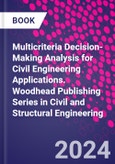Decision-making is a key factor to achieve success in any discipline, especially in a field like civil engineering, which is based on calculations and requires large amounts of information being taken into account. Most processes and procedures are a compendium of many different tasks and requirements specific to each project under development, and making decisions in such environments can often be an arduous endeavor. That is why the need for analytical criteria capable of assisting with untangling complex scenarios has arisen preponderantly.
As an all-encompassing resource, Multicriteria Decision-Making Analysis for Civil Engineering Applications facilitates civil engineers by outlining state-of-the-art techniques for quantitative decision-making to optimally select the appropriate approach when faced with operational issues or to prioritize among multiple options.
Authored by recognized experts in the field, this book proves to be a balanced reference volume that is essential not just for civil engineers, but also for a wide variety of audiences in interconnected disciplines.
Please Note: This is an On Demand product, delivery may take up to 11 working days after payment has been received.
Table of Contents
1. Overview of Decision-making ?
2. Introduction of Multicriteria Decision-making?
3. Scoring Methods
4. Compromising Techniques?
5. Pair-wise Comparison Techniques
6. Outranking Methods
7. Fuzzy Multicriteria Decision-making
8. Group Decision-making
9. Integrated Multicriteria Decision-making Methods
10. AI Algorithms and Multicriteria Decision-making
11. Multicriteria Decision-making Analysis in Microsoft Excel
Authors
Hossein Bonakdari Associate Professor, Department of Civil Engineering, University of Ottawa, Ontario, Canada.Dr. Hossein Bonakdari is a distinguished professor in the Department of Civil Engineering at the University of Ottawa, specializing in mathematical modeling and artificial intelligence (AI). A leading expert in AI-driven data analysis, he has pioneered advanced algorithms for real-time forecasting and big data interpretation, significantly improving the understanding and management of environmental systems.
Dr. Bonakdari has authored four books, published over 320 peer-reviewed journal articles, contributed to more than 20 book chapters, and delivered over 100 presentations at national and international conferences. As a respected editorial board member of several leading journals, he continues to shape research in his field. His groundbreaking contributions have earned him global recognition, ranking him among the top 2% of the world's scientists from 2019 to 2024.
Amir Noori PhD Candidate, Department of Civil Engineering, Faculty of Engineering, University of Ottawa, Ottawa, Ontario, Canada. Amir Noori is a PhD candidate at the Department of Civil Engineering of the University of Ottawa (Canada). He received his MSc in Water Resource Engineering and Management from Razi University (Iran). His research interests are directed at water resources planning, integrated multi-criteria decision-making models, and GIS and RS applications. He developed different novel multi-criteria decision-making techniques to address several practical challenges, which were published in high-impact factor journals. Based on his excellent resume, the University of Ottawa secured him an admission scholarship and he was nominated for the merit scholarship as well. Khosro Morovati Postdoctoral Research Fellow, Department of Hydraulic Engineering, School of Civil Engineering, Tsinghua University, Beijing, China. Dr. Morovati obtained his PhD in Hydraulic Engineering from Tsinghua University (China). His recent works are dedicated to finding nature-based scientific solutions for transboundary rivers and water resource management by developing hydrological, hydrodynamic, data science, and multi-criteria decision-making approaches. His study also looks at the impacts produced by climate variation and human activities on flow regime shifts of rivers and lakes. He has published several papers in high-quality journals.







